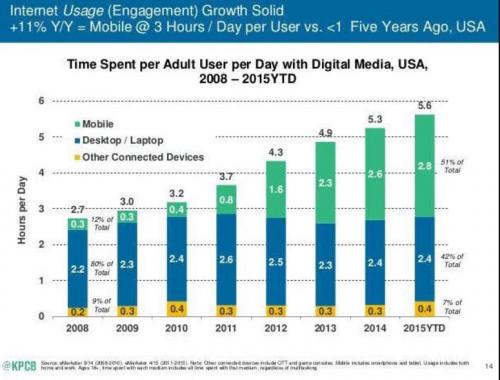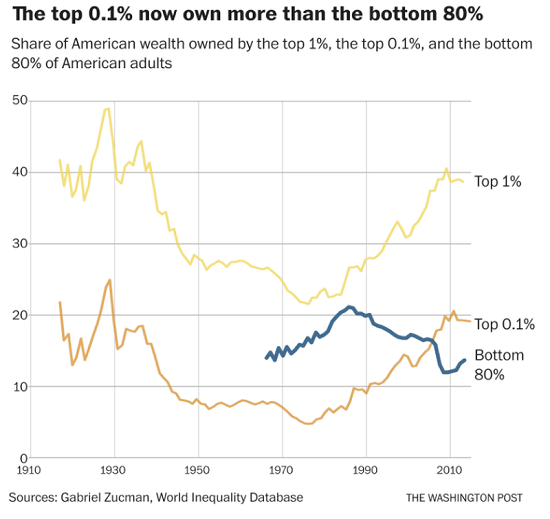Social media offers hope of achieving higher social status, something that is increasingly out of reach in our winner-take-most economy.
I have long held that the decline of social mobility--broad-based opportunities to get ahead financially and socially--is part of a larger dynamic I call social depression: the social decay resulting from economic stagnation and the decline of social mobility and financial security.
America's Social Depression Is Accelerating.
The conventional explanation of social media's addictive hold is that it activates the human brain's reward circuits much like an addictive drug: in effect, we become addicted to being "liked" and to checking our phones hundreds of times a day to see if we received any "likes".
FOMO, fear of missing out on some emotion-stimulating "news" or a "like" from someone in our network also feeds the addictiveness.
The innate addictive appeal of social media is pretty clear, but that's not all that's at work here. Being social animals, humans naturally seek to identify their status in the pecking order and improve their position by whatever means are available as a way of increasing their reproductive success and their relative share of resources.
Traditional societies were bifurcated into a small elite and a much larger mass of commoners. As a general rule, social mobility was limited to those extraordinary commoners who were especially valuable to the ruling elite as soldiers, scribes, etc.
From its inception in the early 1800s, the American Dream was to acquire the "good life" via mass produced luxury goods via conventional employment or entrepreneurial drive--two avenues available to the masses. This access to the social mobility of higher earnings enabling the purchase of status symbols that boosted one's social status has been the mainstay of the modern consumer economy.
The downside of mass-produced luxury items (status symbols) is that in a credit-based economy, just about everyone can afford to own them. Thus just about anyone can qualify for a mobile phone plan that offers a status-symbol iPhone as part of the multi-year contract.
As a result, the upper classes have been forced to greater extremes in cost and scarcity to differentiate themselves from the masses. For example, now that exotic travel is a affordable to anyone with credit, travel has little status value, unless it's extremely costly or difficult to duplicate.
The same is true of the arts and other cultural status markers, along with the traditional markers such as yachts and second (or third) homes.
As the underlying economy has stagnated, access to higher social states via earned income has decayed, and so commoners have been forced to find some other non-financial means to improve their social status.
Social media fits the bill perfectly: it's essentially free (since everyone has to pay for Internet service anyway) and the only "investment" is in time: time snapping and posting photos on Instagram and Facebook, time posting comments and links designed to attract tribal "likes" and so on.
A commoner with essentially zero social status economically can with enough effort become a "big shot" in some social media platform.
The bar is low enough to attract millions of players: a few dozen "likes" is still a potent reward to most people, as are having a couple hundred followers / readers.
Social media superstars with millions of followers on YouTube have cult-like groupies and all the other social status rewards of recognition and fame.
Social media offers hope of achieving higher online social status without having to succeed financially in a winner-take-most economy or having any of the conventional attributes of becoming famous: physical beauty, extraordinary talent, etc. These attributes are of course helpful in attracting a social media following, but they are not essential.
As a result, everyone wonders "how did so-and-so get hundreds of thousands of followers?" The answer varies, of course: a viral video, a high level of marketing moxie, an engaging style, charismatic presence on camera, a knack for something others admire, etc.
If we understand social media as a new and accessible-to-everyone way to improve our social status, its tremendous grip becomes less of a mystery.
As Jesse explains in our Salon #15 podcast, Toxic Tech Platforms and Disposable Social Media Stars, TikTok's explosive popularity is the direct result of its ease of access and promise of social mobility. TikTok's model bypasses the laborious process of gaining social status via collecting masses of followers/friends and offers an instantly accessible version of semi-celebrity via the number of people viewing one's videos-- a semi-celebrity that can be monetized once the numbers get big enough.
Achieving social status through social media is the last-ditch desperation of a society that has lost all other meaningful social mobility ladders. Conventional wages have stagnated for decades and unconventional wages (gig economy, etc.) are generally low and insecure. Credential pathways that once led to secure, high paying, high-status jobs have crumbled; legions of PhDs who were told their years of sacrifice and effort would lead to tenure-track faculty positions or secure positions in government or industry are academic ronin, wandering from temporary position to temporary position, in effect highly credentialed gig-economy workers.
The rungs of the ladder of entrepreneurial drive have decayed as the costs and risks of starting a business have soared, crowding the get-rich-quick hopefuls into the insanely over-crowded casinos of venture-capital funded tech start-ups, all of whom hope to reach the pinnacle of going public and skimming instant wealth--the tech version of a kid dreaming of becoming an NBA star.
A winner-take-most economy is the only possible output of our corrupt financial/political system which has systematically stripmined all sources of social mobility, leaving the masses with little hope of escaping debt-serfdom / just getting by. In this bleak landscape in which the masses constantly lose ground, TikTok and other social media platforms offer a rare beacon of hope to those who have little chance of winning recognition or riches in our winner-take-most economy.
TikTok and other social media reflect the last-ditch desperation of a society stripped of economically meaningful social mobility and positive social roles. Unfortunately the social media platforms are toxic to both their enthralled users and society at large.
Of related interest:
Recent Podcasts:
NOTE: Contributions/subscriptions are acknowledged in the order received. Your name and email remain confidential and will not be given to any other individual, company or agency.
Thank you, James C. ($10/month), for your outrageously generous pledge to this site -- I am greatly honored by your longstanding support and readership. | | Thank you, James Y. ($10/month), for your outrageously generous pledge to this site -- I am greatly honored by your steadfast support and readership. |



